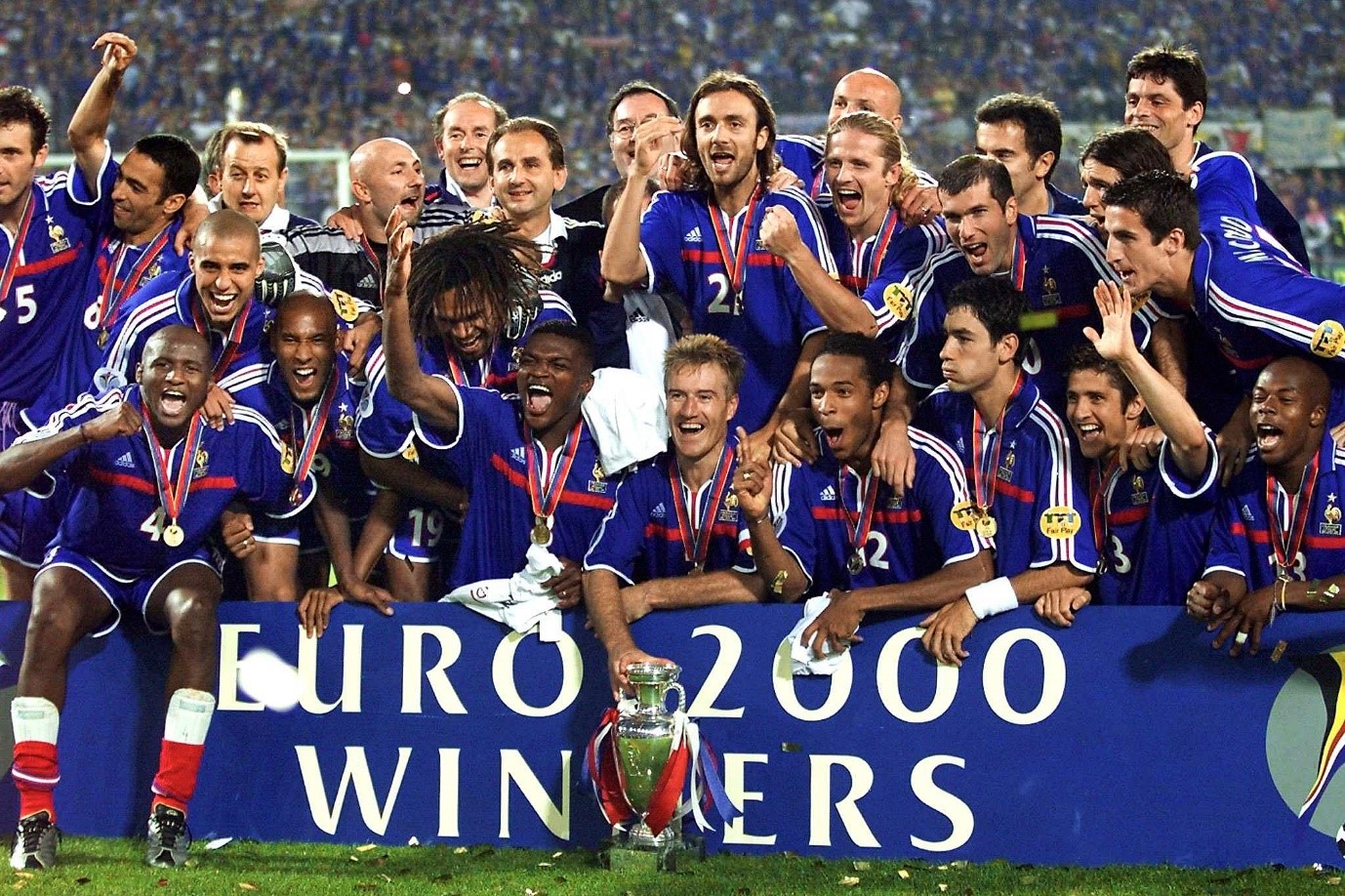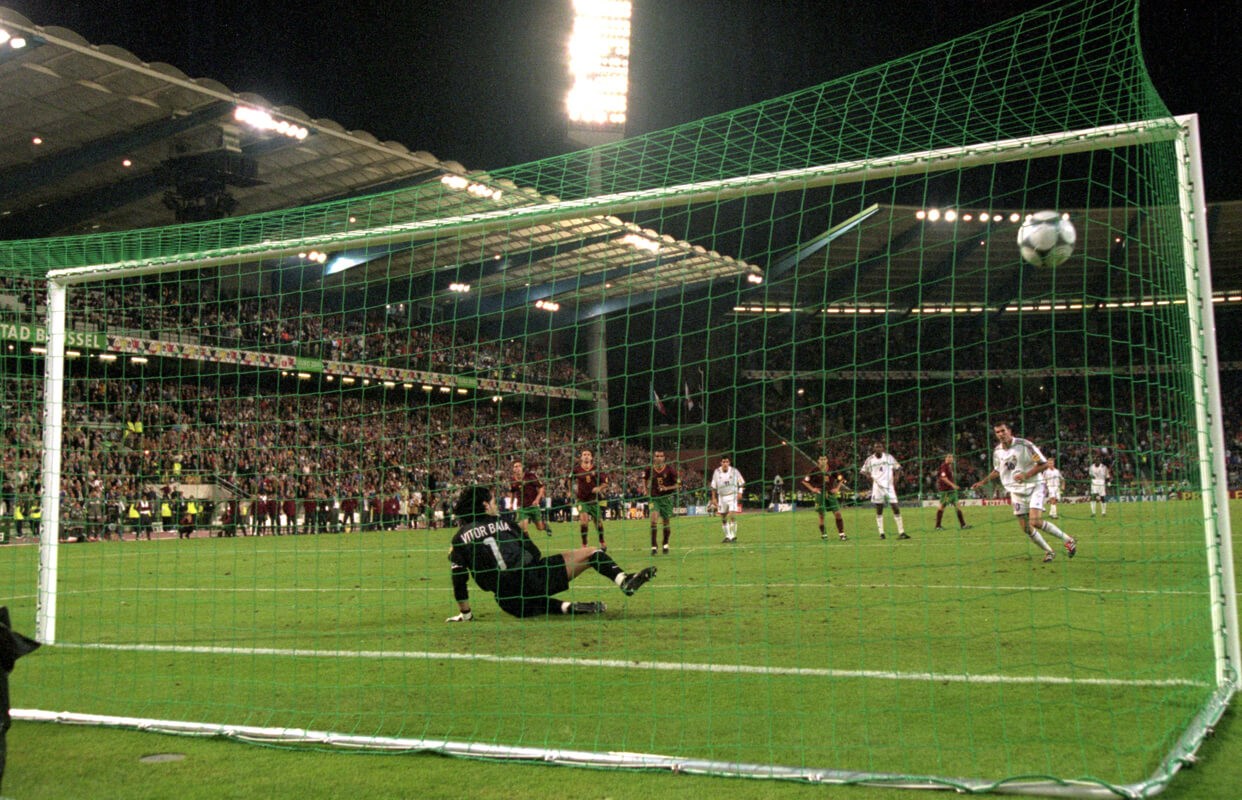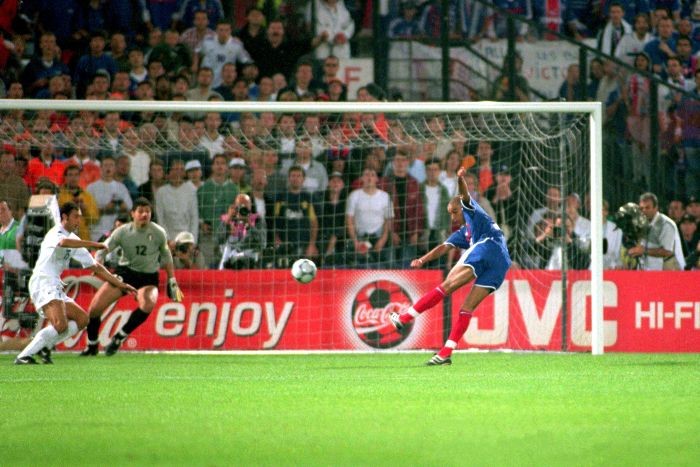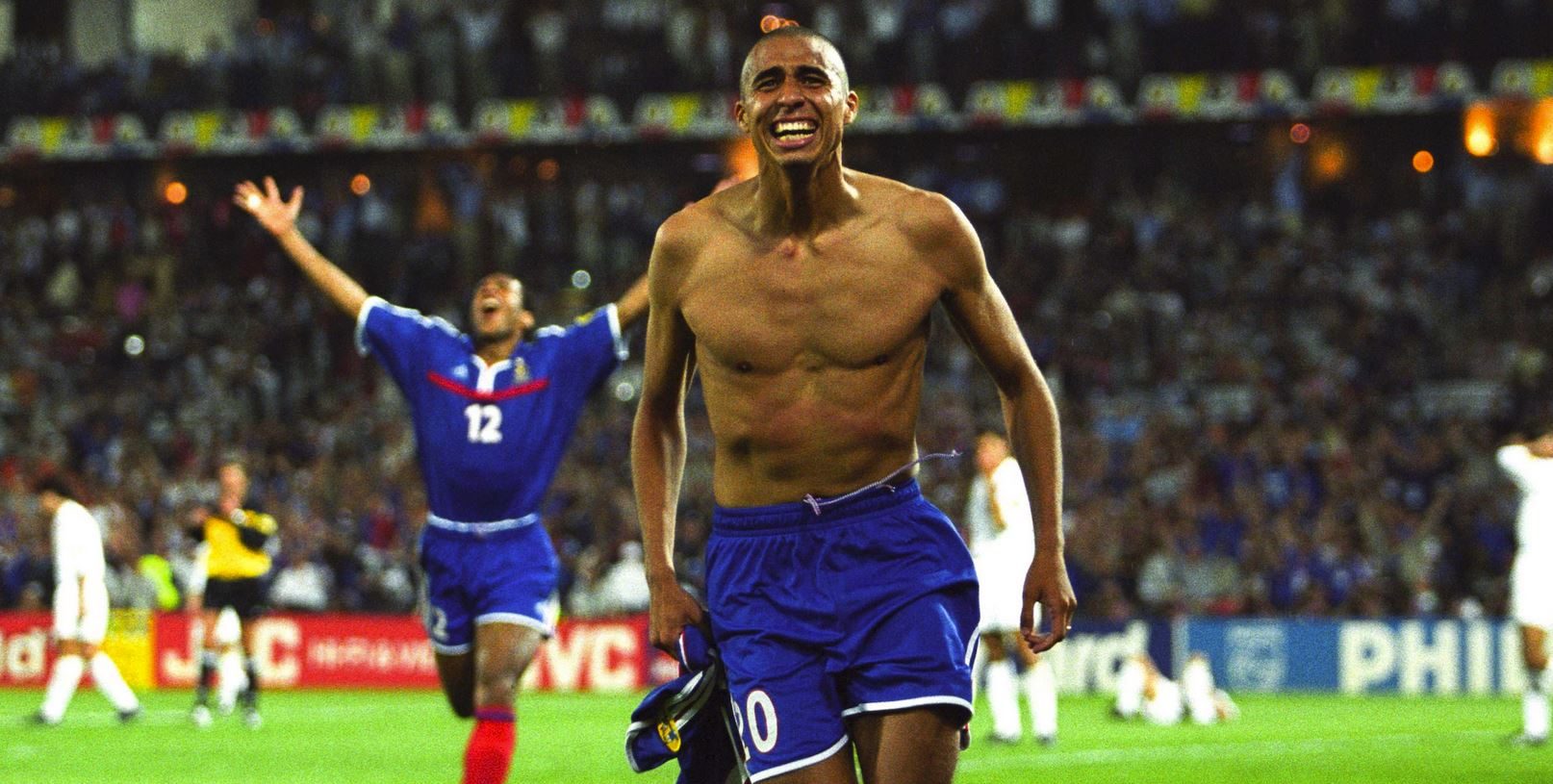The year 2000 marked a new beginning as humanity bid farewell to the 20th century and entered a new phase of evolution. Ironically or not, one of the first major venues to mark a new page in human history was a major football tournament – Euro 2000. It was the first ever European Championship hosted by two nations: The Netherlands and Belgium cooperated to welcome the 11th edition of the tournament.
Euro 2000 is considered one of the finest tournaments of all time, largely due to the excitement it generated. Wonderful matches, some outstanding individual performances and the fantastic atmosphere created, especially by the Dutch supporters, made it an unforgettable tournament.
Taking all this into consideration, the 2000 edition is best defined for its flood of goals, with teams averaging 2.74 goals per game – the highest record to date. In addition, another record was set that still stands: six games produced five or more goals, and both Semi-Finals and Final also went to extra time.
Although the stadiums at Euro 2000 were resplendent in orange, the color of the tournament was ultimately blue. After success at the 1998 World Cup on home soil, France were seen as one of the favorites to do the unthinkable: Follow up the World Cup triumph two years later with victory at the European Championship. No team had ever managed that prior to the Euro 2000 tournament, as Les Bleus were looking to put their name in the football hall of fame.
The tournament continued its revamped format introduced four years ago, with 16 contesting nations split into four groups of four, with the top two teams from each group advancing to the knockout phase. Eleven teams that took part at the European Championship in England four years earlier also made it to Euro 2000. Likewise, there were several nations making their long-awaited return after missing out on previous tournaments, including one of the co-hosts Belgium, 1992 Semi-Finalists Sweden and Yugoslavia, for whom it was the first major tournament after the 1992 ban. Norway and Slovenia were the only two countries to make their debut in the competition.

Some might call it arrogance, others confidence, but the France Euro 2000 team was considered even stronger than the team that won the World Cup two years earlier. Aime Jacquet was replaced as head coach by Roger Lemerre, who assisted him on the way to Les Bleus’ victory in 1998 and had a glittering squad with some of the best players in the world to choose from. As Jacquet’s successor, Lemerre had no need to change the style of play of the 1998 winning team, and was very familiar with the philosophy the previous manager had instilled.
Zinedine Zidane was the obvious star name in a sea of other high-profile French players. Les Bleus played in a 4-2-3-1 or 4-3-2-1 formation throughout the tournament, with Zizou remaining the focal point of this French side despite the change in team shape, as the 1998 Ballon d’Or winner was assigned a free role as No. 10. He was the one who set the tempo when he had possession of the ball, often dribbling slowly through the middle third and beating the opposing players in static one-on-one situations before releasing a pass.
Although Zidane was the center of attention, and rightly so, such luminaries as Thierry Henry, Robert Pires, Marcel Desailly, Patrick Vieira and Didier Deschamps can not be forgotten. David Trezeguet and Nicolas Anelka were the other two strikers alongside Henry. They made this French team utterly irresistible after it was widely known that the only position Les Bleus lacked in quality at the 1998 World Cup was a world-class striker. Now Lemerre had three at his disposal, making France the most feared team of the tournament.
France were drawn into a relatively tough group alongside the 1996 European Championship finalists Czech Republic, the 1992 tournament winners Denmark and the Netherlands, who reached the World Cup Semi-Finals only two years earlier. Although the Danes and the Czechs entered the tournament as respectable teams, it was all about the hosts and France, who would finish first in the group.
Both were considered clear favorites to progress through the group stage, with the head-to-head set as the final Group A fixture and potential first place decider. And indeed, the top spot in Group D was decided between these two nations, with the Dutch twice overturning the deficit to beat the French 3-2.
After finishing second in their group, France had to face the best team of Group C in their bid to European Championship glory. Zidane set Les Bleus on their way to a continental championship triumph with a brilliant free-kick goal just after the half-hour mark. Spain equalized when Gaizka Mendieta safely converted a penalty, but France were quick to reply, with Youri Djorkaeff putting his nation ahead a minute before half-time. It looked like Spain would be eliminated from another major tournament despite a promising start in the group stage when Fabian Barthez hauled down Abelardo and the referee pointed to the spot. Up stepped Raul, but only to blast his penalty high into the sky.
Portugal, inspired by Luis Figo, went all the way to the Semi-Finals, being France’s next opponent. With both teams making some changes from their Quarter-Final encounters, the game took some time to settle down. After the end of the tactical cat-and-mouse in the opening exchanges, France captain Didier Deschamps had the first clear chance to put Les Bleus ahead, but his shot landed straight at goalkeeper Vítor Baía. France continued to press, Abel Xavier clearing a Zidane free-kick and, at the other end, Nuno Gomes made an unlikely breakthrough after Sergio Conceiçao’s ball had bounced off several players.
The reaction was initially muted, but gradually Henry, Laurent Blanc and Anelka asked questions of Vitor Baía – albeit not particularly strenuous ones. At the other end, Luís Figo’s shot was blocked by the retreating Marcel Desailly as the game slowly picked up pace. Six minutes after the restart, another goal was scored when Anelka picked up a pass from Lilian Thuram and found Henry near the penalty spot. The Arsenal striker turned and fired low into the net to make the score 1-1.
Then came the decisive penalty deep into extra time, awarded for handball by Abel Xavier. As expected, Zidane held his nerve to score the golden goal penalty that sent France to the final of a second consecutive major tournament.

France and Italy faced off each other in the Final, with both sides gunning for their second European Championship title. The Azzurri were inches away from victory, despite their pragmatic and defensive approach that allowed the opposing teams to control the ball for long stretches.
On their way to the Final, the Italians averaged just 40% possession and literally threw away the European Championship trophy due to their finishing woes. In this regard, their Semi-Final against the Netherlands, which the Azzurri won on penalties after holding the Dutch to a goalless stalemate despite playing with one man less for most of the game, was exemplary.
Both managers opted to make changes for their respective starting line-ups, with Djorkaeff and Christophe Dugarry starting for France, while Marco Delvecchio replaced Filippo Inzaghi for Italy. In a lively start to the Final, France were the first to create danger when a shot from Henry bounced off the crossbar of Francesco Toldo’s goal, with the Italian keeper having to pull off a smart save to thwart Djorkaeff’s attempt on the next attack. In contrast, the Azzurri’s only dangerous action in the first half came from Demetrio Albertini, who almost scored the opening goal with a free-kick.
The Final truly came to life in the second half. Italy were the ones to make a breakthrough in the 55th minute of play when Delvecchio volleyed the ball into the net from close range after connecting to a cross from Gianluca Pessotto. A few minutes later, a man who had lost his place in the starting line-up for the final – Alessandro Del Piero – had a glorious chance to become the nation’s hero after being substituted at half-time. The Juventus striker found himself one-on-one with Fabien Barthez a minute before the hour mark, but he was unable to convert his chance which would have made the title safe for the Azzurri.
Twenty-five minutes later, Del Piero found himself in the same position when he ran alone towards goal with only the French keeper to beat, but the chance was also missed. These two wasted opportunities summed up his tournament: The striker had five big goal-scoring chances throughout the tournament, but could only put the ball in the net once against Sweden.

Despite failing to close out the game and claim their second European Championship title in history, Italy held on to a slim 1-0 lead thanks to a heroic defensive performance. France struggled to find a way past the brilliant Toldo, forcing Lemerre to deploy his third striker – Trezeguet – in a desperate search for an equalizer. France’s dream of a major tournament double seemed to be shattered until Sylvain Wiltord broke free on the left side of the penalty area three minutes into injury time to send a low drive past Toldo.
After snatching a draw from the jaws of the defeat, France now had momentum on their side as the game headed into Golden Goal extra time. It looked like France’s winner was coming when Zidane had his shot deflected wide from a Robert Pires’ cross in the early minutes of extra time. Then, in the 103rd minute, it did indeed happen as the Arsenal winger tricked his way down the left before playing a cut back to substitute Trezeguet, who riffled a first time shot into the roof of the net. The French fans could cheer as Les Bleus completed a remarkable major tournament double.
Read the previous episodes of our History of the UEFA Euro:
1960, The Humble Beginnings
1964, Spain’s Forgotten Glory
1968, A Year of Firsts and Lasts
1972, Dream Debut for West Germany
1976, The Year of The Panenka
1980, The Belgium Challenge
1984, Platini’s Edition to Remember
1988, Van Basten and the Dutch Conquest
1992, The Denmark Fairy Tale
1996, Penalty Shootouts and Golden Goals

